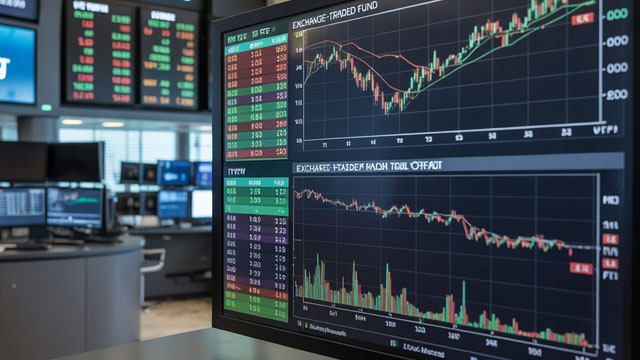Goldman Sachs Equal Weight U.S. Large Cap Equity ETF (GSEW)
| Assets | $1.65B |
| Expense Ratio | 0.09% |
| PE Ratio | 23.29 |
| Shares Out | 18.70M |
| Dividend (ttm) | $1.29 |
| Dividend Yield | 1.47% |
| Ex-Dividend Date | Dec 23, 2025 |
| Payout Frequency | Quarterly |
| Payout Ratio | 35.06% |
| Volume | 57,832 |
| Open | 88.83 |
| Previous Close | 89.21 |
| Day's Range | 87.98 - 89.37 |
| 52-Week Low | 65.88 |
| 52-Week High | 90.11 |
| Beta | 1.00 |
| Holdings | 503 |
| Inception Date | Sep 12, 2017 |
About GSEW
Fund Home PageThe Goldman Sachs Equal Weight U.S. Large Cap Equity ETF (GSEW) is an exchange-traded fund that mostly invests in large cap equity. The fund tracks an equal-weighted index of US large-cap stocks. GSEW was launched on Sep 12, 2017 and is issued by Goldman Sachs.
Top 10 Holdings
2.75% of assets| Name | Symbol | Weight |
|---|---|---|
| Texas Pacific Land Corporation | TPL | 0.30% |
| Lumentum Holdings Inc. | LITE | 0.30% |
| Ubiquiti Inc. | UI | 0.28% |
| Vertiv Holdings Co | VRT | 0.28% |
| Moderna, Inc. | MRNA | 0.27% |
| Keysight Technologies, Inc. | KEYS | 0.27% |
| Axon Enterprise, Inc. | AXON | 0.26% |
| Ciena Corporation | CIEN | 0.26% |
| MasTec, Inc. | MTZ | 0.26% |
| Coherent Corp. | COHR | 0.26% |
Dividend History
| Ex-Dividend | Amount | Pay Date |
|---|---|---|
| Dec 23, 2025 | $0.3743 | Dec 30, 2025 |
| Sep 24, 2025 | $0.34736 | Sep 30, 2025 |
| Jun 24, 2025 | $0.32985 | Jun 30, 2025 |
| Mar 25, 2025 | $0.24084 | Mar 31, 2025 |
| Dec 23, 2024 | $0.39799 | Dec 30, 2024 |
| Sep 24, 2024 | $0.25139 | Sep 30, 2024 |
Performance
GSEW had a total return of 15.56% in the past year, including dividends. Since the fund's inception, the average annual return has been 11.37%.
News

As Concentration Risk Rises in 2026, Equal Weighting Can Stand Out
While geopolitics and international security are the headline threats to markets right now, concentration risk hasn't gone away. AI may not be a bubble, but the huge role played by a handful of tech f...

GSEW: Value And Diversification
The Goldman Sachs Equal Weight U.S. Large Cap Equity ETF is an equal-weight ETF holding about 500 stocks rebalanced twice a year. The equal weight strategy enhances value characteristics and reduces c...
"ETF's are here to stay" says Todd Rosenbluth of TMX VETTAFI
Todd Rosenbluth, Head of Research TMX VETTAFI, joins CNBC's "Halftime Report" to discuss the record year for the ETF industry.

GSEW: The Answer To Idiosyncratic Risk In The S&P 500
Goldman Sachs Equal Weight U.S. Large Cap Equity ETF aims to provide a more balanced exposure to large-cap stocks, reducing the impact of mega-cap Tech names. Equal-weight portfolios offer greater div...

GSEW: Is Equal-Weight Really Worth It?
Goldman Sachs Equal Weight U.S. Large Cap Equity ETF is a competitor to Invesco S&P 500 Equal Weight ETF with cheaper fees and a monthly rebalancing. A more frequent rebalancing may be an edge in cert...

GSEW: An Equal Weight Fund For 'V'-Shaped Recoveries
The large-cap mega-tech companies have rallied hard in 2023, causing market-weight funds to outperform equal-weight ETFs. Equal-weight ETFs like GSEW provide an allocation of roughly 0.2% to each indi...

GSEW: Is Goldman Sachs' Equal-Weight Large-Cap ETF Better Than Invesco's RSP?
GSEW holds 500 of the largest U.S. companies in equal weight. It differs from RSP by having a more objective selection process, a monthly rebalancing process, and lower fees. Fundamentally, the two ET...

GSEW: The Equal-Weight ETF With Pocket-Friendly Fees
GSEW is an equal-weighted large-cap blend ETF with a 0.09% expense ratio, the second-cheapest on the market. This 500-stock fund has $670 million in assets under management. However, its track record ...

GSEW Vs. RSP: 2 Competing Equal-Weighted Large-Cap ETFs
The Goldman Sachs Equal Weight U.S. Large Cap Equity ETF (GSEW) can invest in Large-Cap stocks in or outside of the S&P 500 Index. The Invesco S&P 500 Equal Weight ETF (RSP) only uses S&P 500 Index st...

GSEW: Smart Beta Not Supportive Of Higher Returns, Lower Volatility
GSEW has a smart-beta strategy focusing on the most expensive U.S. companies with an equal-weight approach at its core instead of traditional market cap weighting. Anecdotal evidence suggests that equ...

3 Equal-Weight ETFs Soaring To Record Heights
There's something to the concept of equally weighting stocks in exchange traded funds.

2 Questions: Length Of Recession, Near-Term Strategy Choices - Weekly Blog # 600
It is important to separate economic contractions, which we call recessions, and market crashes. Economic recessions have a much greater impact on investment portfolios than so-called stock market cra...

